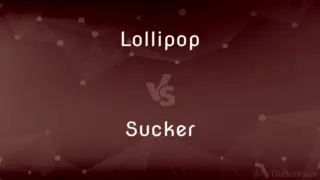Poppa vs. Papa — What's the Difference?
By Tayyaba Rehman — Updated on November 6, 2023
"Poppa" and "Papa" are both affectionate terms for father, but "Papa" is more commonly used and widely recognized.

Difference Between Poppa and Papa
Table of Contents
ADVERTISEMENT
Key Differences
"Poppa" is an alternative spelling and pronunciation of "Papa," which is a term of endearment for a father. The use of "Poppa" might be influenced by regional dialects or personal preference.
"Papa," on the other hand, is a universal term across various languages for father or dad. It is often used by children when referring to their father and can carry a warm, familiar tone.
In some households, "Poppa" could be used to add a layer of uniqueness or individuality to the father figure, possibly reflecting a family's internal culture or heritage.
"Papa" has historical depth, featuring in classic literature and common parlance. It is a term that spans cultures, reflecting its broader acceptance and usage compared to "Poppa."
Despite the slight differences, both "Poppa" and "Papa" serve the same emotional purpose. They personalize the paternal role within a family, signifying love and respect for a father.
ADVERTISEMENT
Comparison Chart
Pronunciation
May vary by region or family preference.
Generally standardized.
Usage Frequency
Less common than "Papa."
More widely used.
Cultural Prevalence
May be more localized or idiosyncratic.
Universally recognized.
Emotional Connotation
Warm, possibly more informal.
Affectionate, familiar.
Linguistic Origin
Variation of "Papa," potentially influenced by English dialects.
Derived from Latin "pater," with parallels in many Indo-European languages.
Compare with Definitions
Poppa
An informal term for father.
I asked Poppa if he'd like to go fishing.
Papa
A common term for dad or father.
Papa is my hero.
Poppa
A family's term for a paternal figure.
Poppa will read us a story tonight.
Papa
Can indicate affection and closeness.
Come here, Papa, and see what I made!
Poppa
Sometimes used to refer to a grandfather.
Poppa taught me to play chess.
Papa
Used across various languages to mean father.
In French, ‘papa’ also means dad.
Poppa
A nickname for a father figure in a community.
Everyone calls him Poppa Joe.
Papa
Sometimes a term for the paternal side of a family.
We're visiting Papa's relatives this weekend.
Poppa
Used endearingly for someone who acts like a father.
He's not my biological father, but he's my Poppa.
Papa
One's father
Papa had taught her to ride a bicycle
He saw his papa's face change at this news
Poppa
Another term for father
Oh, Poppa will be pleased
Papa
A code word representing the letter P, used in radio communication.
Poppa
Variant of papa.
Papa
Father.
Poppa
Father, papa.
Papa
Dad, daddy, father; a familiar or old-fashioned term of address to one’s father.
Papa
(informal) A pet name for one's grandfather.
Papa
A parish priest in the Greek Orthodox Church.
Papa
(international standards) nodot=1 NATO/ICAO Phonetic Alphabet.}}
Papa
A child's word for father.
Papa
A parish priest in the Greek Church.
Papa
An informal term for a father; probably derived from baby talk
Papa
A title for the Pope in Italian.
The children cheered, 'Viva il Papa!'
Common Curiosities
Which term is more widely recognized globally?
"Papa" is more universally recognized.
What is "Poppa"?
A term of endearment for father.
Is "Poppa" a correct spelling?
Yes, though less common.
Can "Poppa" refer to a grandfather?
It can, in some familial contexts.
Do "Poppa" and "Papa" have the same origin?
Yes, both derive from affectionate terms for father.
How is "Papa" commonly used?
As a familiar term for one's father.
Can "Poppa" and "Papa" be used interchangeably?
Yes, they are often interchangeable.
Is "Papa" understood in multiple languages?
Yes, many languages use "Papa" or a variant.
Might "Poppa" be favored in certain regions?
Yes, it can be a regional preference.
What emotional connotation does "Papa" carry?
It conveys warmth and familiarity.
Could "Poppa" be a nickname?
Yes, it can serve as a nickname.
Are there songs or literature using "Poppa"?
There are fewer than with "Papa."
Is it common to find "Poppa" in children's books?
"Papa" is more commonly found in children's literature.
Are these terms used in formal contexts?
They are typically used in informal, familial settings.
In what context might "Papa" refer to the Pope?
In Italian, "Papa" means Pope.
Share Your Discovery

Previous Comparison
Law vs. Constitution
Next Comparison
Lollipop vs. SuckerAuthor Spotlight
Written by
Tayyaba RehmanTayyaba Rehman is a distinguished writer, currently serving as a primary contributor to askdifference.com. As a researcher in semantics and etymology, Tayyaba's passion for the complexity of languages and their distinctions has found a perfect home on the platform. Tayyaba delves into the intricacies of language, distinguishing between commonly confused words and phrases, thereby providing clarity for readers worldwide.













































